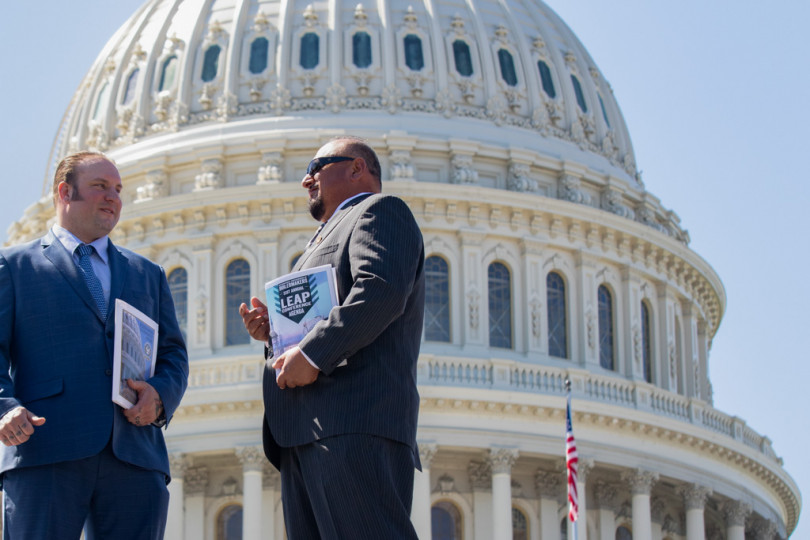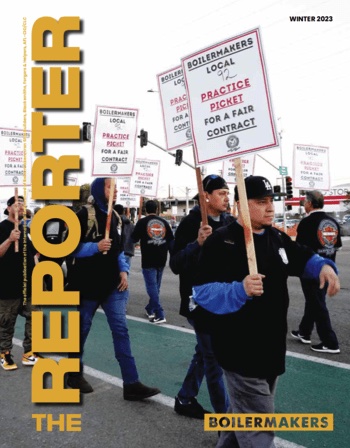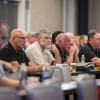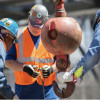It’s imperative that our work includes advocating for political decisions that protect our union, our members and our work.
POLITICAL ACTION IS a vital component of the work unions do to advocate not only for their members’ interests but often also for the interests of all working people. The Boilermakers history of involvement in political action goes back to the earliest days of the union, beginning largely with efforts to support candidates who would, in turn, support the positions and concerns of Boilermakers.
While supporting candidates who support Boilermaker initiatives is still a part of political action, through the Legislative Education Action Program, Boilermakers are better equipped to raise their collective voices—sometimes with other unions—as effective lobbyists at the local, state and even national levels.
“Union political action has historically been a major force that has driven critical changes in United States labor laws that protect workers, such as child labor laws, anti-discrimination laws, the 40-hour workweek, federal minimum wage, workers compensation, unemployment insurance, and many health and safety laws,” says Cecile Conroy, Director of Government Affairs. “It’s imperative that our work includes advocating for political decisions that protect our union, our members and our work.
“And when the International Brotherhood of Boilermakers chooses to endorse a political candidate, it is because that candidate has a history of supporting measures that are beneficial to the labor movement and the work our members do. Our political action is aimed to benefit Boilermakers.”
What we do as Boilermakers participating in shaping legislation is the culmination of more than a century of brothers and sisters watching out for one another and raising our voices together for what’s right.
Director Conroy represents Boilermaker interests and national political relationships, and she leads LEAP efforts to ensure Boilermakers are plugged into key political issues and policy makers.
Traditionally, an annual LEAP conference in Washington, D.C. convenes Boilermaker delegates to learn the latest legislative issues on the table and how to advocate to support the union’s position on those issues. Delegates also gain insight from influential political analysts and other political movers and shakers during plenary sessions. A workshop is available for Boilermakers who want a crash course in the political process, best practices in lobbying and how bills become law. The conference culminates with many of the delegates going to Capitol Hill to meet face-to-face with legislators representing their states and districts.
“All things are political—that’s the reality in most of America, and LEAP is about building relationships with legislators so they’re more receptive to hearing us,” says Tom Ryan, president of Local 5, Zone 5 (Floral Park, New York), who has been going to LEAP conferences for at least 11 years and looks forward to meeting with his elected representatives. “To be there on Capitol Hill and to actually sit in the offices that a member of congress sits in—and speak directly to a member of congress as a representative of my union, it’s really incredible.
“I’m ‘just’ some hard-hat guy, but the vast majority of the legislators want to hear what we have to say—even if they might not agree with us.”
Conroy stresses that while the COVID-19 pandemic forced LEAP to cancel this year, it is perhaps more important than ever for Boilermakers to stay tuned in to legislative issues—as well as political allies and opponents—and to represent Boilermaker positions wherever possible.
I’m ‘just’ some hard-hat guy, but the vast majority of the legislators want to hear what we have to say—even if they might not agree with us.
“Having those face-to-face meetings with elected officials—whether that’s in the House and Senate offices on Capitol Hill, in a statehouse or in a local municipal office—are such a valuable way to communicate Boilermaker positions and build relationships with legislators, but that doesn’t mean there aren’t other ways we should be communicating with them and advocating,” Conroy says. “Phone calls, emails and letters—especially when they’re done as a collective effort among a large group of people—can be effective in getting a legislator’s attention.”
Ryan says that in addition to participating in formal LEAP activities, another way to advocate is by participating in rallies and efforts that reflect Boilermaker positions, led by other organizations.
“No matter how insignificant you think you are, there’s always something you can do,” he says. “Just to be a person at a rally clapping and offering encouragement and support is something. And of course, educating others on Boilermaker issues—wither it’s the guy you’re eating lunch with, your carpool partner or your neighbor.”
The Boilermakers Government Affairs office curates and maintains resources to keep Boilermakers in touch with issues important to labor and Boilermaker interests, including links to political toolkits, voter registration, information about the political process and more to assist Boilermakers’ advocacy work. Much of that information is available online in the Members section of the Boilermakers website (directly at www.boilermakers.org/LEAP).
“What we do as Boilermakers participating in shaping legislation is the culmination of more than a century of brothers and sisters watching out for one another and raising our voices together for what’s right,” says International President Newton B. Jones. “We have more than a century invested in hard-earned labor protections we must continue to fight for, preserve and build upon, as well as issues, such as those that impact the energy industry, that our livelihoods as Boilermakers depend upon.
“When Boilermakers sit down with, call, write and advocate to elected representatives, our voice is mighty, and when Boilermakers use our voice and vote to educate others, it makes a difference.”
Quick history of LEAP and Boilermaker political involvement
- In 1920, the International Brotherhood of Boilermakers appointed its first legislative representative, Jasper N. Davis, and sent him to Washington, D.C. to track legislation and lobby members of congress. Brother Davis began a regular “Your Washington Reporter” column in the Boilermaker “journal” to publish his D.C. observations, share information on upcoming legislation and offer specific action for members to consider at the ballot box. The column continued long after Davis' role ended and was an important convener for collective Boilermaker legislative work.
- After World War II, the International established what was called the “Non-Partisan Political League” to educate members and move them to political action. Efforts went on for several decades to engage more members to “get out the vote,” but, according to the history book Grace Under Pressure, there was a big problem: Workers simply didn’t register to vote.
- In 1965, delegates from the Iron Ship Builders Marine Council Conference proposed a resolution to the 22nd Consolidated Convention calling for a Boilermaker-Blacksmith Political Education and Legislative Committee to “direct and coordinate an effective, continuing program of political action activities”—the beginning of what is now known as LEAP, the Legislative Education Action Program.
- The first LEAP conference was held in Washington, D.C. in 1969 with more than 100 attendees, and since then, barring unforeseen circumstances such as a global pandemic, Boilermakers have met there each year to take the union’s agenda to Capitol Hill, meeting with and lobbying decision makers literally in their offices.
- In 2018, LEAP celebrated its 50th anniversary in Washington, D.C. with over 175 Boilermaker delegates and top-notch speakers such as AFL-CIO President Richard Trumka and political analyst Charlie Cook.







